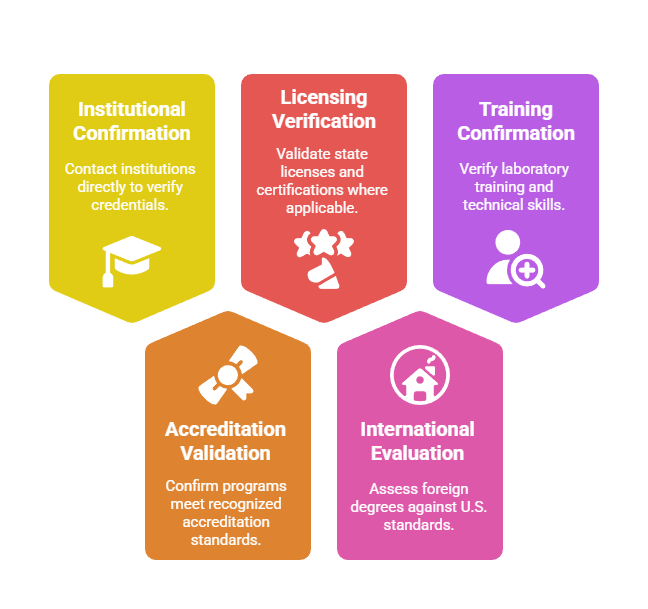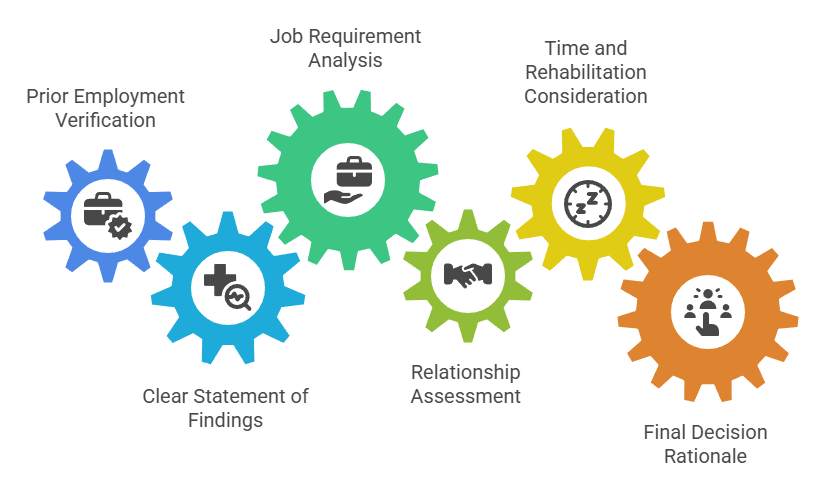New Jersey biotech employment screening requires specialized expertise navigating FDA regulations, DEA compliance for controlled substances, and state-specific requirements across the pharmaceutical corridor spanning from Princeton to Newark. Companies operating in biopharmaceutical manufacturing, clinical research, and laboratory environments must implement comprehensive background verification programs that protect intellectual property, ensure regulatory compliance, and mitigate risks associated with handling sensitive compounds and proprietary research data.
Key Takeaways
- New Jersey's biotech industry employs over 115,000 workers across pharmaceutical manufacturing and research facilities, requiring specialized employment screening protocols that exceed standard background check practices.
- FDA-regulated facilities must implement credential verification for personnel with access to controlled substances, with DEA-compliant screening programs essential for companies handling Schedule II-V medications.
- Biotech security clearance requirements include education verification, professional licensing validation, criminal history reviews, and reference checks specifically tailored to laboratory and manufacturing environments.
- Pharmaceutical manufacturing background verification must address intellectual property protection, with many companies implementing enhanced screening for employees accessing proprietary formulations and clinical trial data.
- New Jersey biotech compliance screening standards require adherence to both federal regulations (FCRA, FDA 21 CFR Part 11) and state-specific requirements under the New Jersey Cannabis Regulatory Commission for companies in emerging sectors.
- Laboratory personnel background checks should verify scientific credentials, research integrity history, and prior employment in regulated environments to prevent data falsification and ensure quality control.
- Biopharmaceutical industry screening standards typically include 7-10 year criminal history searches, continuous monitoring programs, and insider threat assessments for employees with facility access.
- Rapid scaling biotechs face unique challenges implementing compliant screening programs while maintaining competitive hiring timelines, requiring strategic partnerships with specialized background screening providers.
Understanding New Jersey's Biotech Employment Landscape
New Jersey's pharmaceutical corridor represents the densest concentration of life sciences companies in North America. The state hosts over 400 biotech and pharmaceutical companies spanning from Johnson & Johnson's headquarters in New Brunswick to Merck's sprawling Rahway campus. This ecosystem creates unique employment screening demands that blend traditional background verification with specialized regulatory compliance.
The concentration of drug manufacturing facilities, clinical research organizations, and specialty laboratories creates heightened scrutiny from federal regulators. Companies operating in this environment face regular FDA inspections, DEA audits, and increasing concerns about industrial espionage targeting proprietary research. Consequently, employment screening programs must function as the first line of defense against internal threats while ensuring every hire meets stringent regulatory qualifications.
The state's biotech sector generates $46 billion in annual economic output. This economic impact makes employment screening protocols critical infrastructure for maintaining industry integrity and regulatory standing. Moreover, the rapid innovation cycles and competitive talent market create pressure to balance thorough verification with efficient hiring timelines.
Regulatory Framework Governing Biotech Hiring
Federal and state regulations create overlapping compliance requirements for New Jersey biotech employment screening programs. The FDA enforces personnel qualification standards under 21 CFR Part 211 for pharmaceutical manufacturing. These regulations require companies to document that employees possess education, training, and experience appropriate for their assigned duties.
The DEA imposes additional requirements for facilities handling controlled substances. These requirements mandate background checks and security clearances for personnel with access to Schedule II-V medications. Furthermore, New Jersey state law adds employment screening requirements under the Cannabis Regulatory Commission Act for companies operating in medicinal and adult-use cannabis sectors, which increasingly overlap with traditional pharmaceutical operations.
FCRA compliance represents the foundational legal framework governing all employment background checks. This federal law requires employers to obtain written authorization, provide pre-adverse action notices, and maintain dispute resolution procedures. For biotech companies, FCRA compliance intersects with industry-specific regulations, creating complex workflows that demand specialized expertise.
The Pharmaceutical Corridor's Unique Screening Challenges
New Jersey's biotech companies face distinct employment screening challenges driven by the industry's rapid innovation cycles. Start-up biotechs transitioning from research-stage operations to commercial manufacturing often lack established HR infrastructure for implementing compliant screening programs. These growing companies must simultaneously scale their workforce, establish FDA-compliant quality systems, and implement background verification protocols that satisfy regulatory inspectors.
Intellectual property protection drives enhanced screening requirements beyond standard regulatory compliance. A single employee with access to proprietary cell lines, manufacturing processes, or clinical trial data could compromise hundreds of millions in research investment. Recent cases of industrial espionage targeting New Jersey biotech companies have prompted many organizations to implement continuous monitoring programs, insider threat assessments, and enhanced security clearances.
These programs must operate within privacy law constraints while providing meaningful risk mitigation. Companies must balance comprehensive screening against both foreign intelligence services and competitive intelligence gathering by rival companies. Additionally, prolonged background check processes can result in losing top scientific talent to competitors in an industry where specialized skills command premium compensation.
Essential Components of Biotech Security Clearance Requirements
Biotech security clearance requirements extend beyond traditional employment background checks to encompass specialized verification protocols. These comprehensive programs evaluate candidates across multiple dimensions including scientific credentials, research integrity, financial stability, and potential conflicts of interest. The goal is identifying individuals who not only possess required qualifications but also present acceptable risk profiles for positions involving access to controlled substances, proprietary research, or sensitive manufacturing processes.
Security clearance frameworks for biotech companies typically follow tiered approaches based on position sensitivity and access levels. Entry-level laboratory technicians may require basic criminal background checks and education verification. In contrast, senior scientists accessing proprietary formulations undergo enhanced screening including financial background reviews and international activity assessments. This risk-based approach allows companies to implement proportionate screening investments while maintaining regulatory compliance across all position categories.
Criminal History and Regulatory Disqualifications
Criminal history reviews for pharmaceutical manufacturing background verification must consider both direct disqualifications and risk-based decision making. FDA regulations do not explicitly prohibit individuals with criminal histories from pharmaceutical employment. However, companies bear responsibility for determining whether prior offenses create unacceptable risks given specific job duties.
DEA regulations impose clearer standards for positions with controlled substance access. These regulations require companies to determine applicants have not been convicted of felonies related to controlled substances within five years preceding employment. Additionally, companies must evaluate the nature of offenses, their relationship to job responsibilities, and time elapsed since conviction when making hiring decisions.
| Offense Category | Typical Lookback Period | Risk Considerations |
| Controlled substance violations | 7-10 years | Direct relevance to DEA compliance; may create permanent disqualification for controlled substance access roles |
| Fraud or theft offenses | 7-10 years | Indicates potential risk to intellectual property, inventory control, and research data integrity |
| Violent crimes | 7 years | Workplace safety considerations; may be less relevant for scientific positions without direct patient contact |
| Regulatory violations | Lifetime | Prior FDA warning letters, debarment proceedings, or research misconduct findings create heightened scrutiny |
New Jersey biotech compliance screening requires balancing regulatory protection with fair chance hiring principles. Several New Jersey municipalities limit the timing of criminal history inquiries, though exceptions exist for positions involving controlled substances or vulnerable populations. Companies must implement compliant screening workflows that defer criminal history inquiries until after conditional offer stages while maintaining ability to conduct necessary due diligence.
Scientific Credentials and Education Verification
Education verification represents a critical component of laboratory personnel background checks. Pharmaceutical manufacturing regulations require documented evidence that personnel possess qualifications appropriate for their assigned functions. Degree mills and credential fraud pose substantial risks in scientific hiring, with studies indicating approximately 3% of scientific professionals misrepresent educational credentials.
For biotech companies, unverified credentials could result in FDA observations during inspections. These deficiencies may lead to product quality issues and potential regulatory action if unqualified personnel performed critical manufacturing or quality control functions. Therefore, comprehensive education verification becomes essential for both compliance and operational integrity.
Comprehensive education verification for biotech positions should include several key components:

- Direct institutional confirmation: Contact degree-granting institutions to verify credentials rather than relying on candidate-provided documents
- Accreditation validation: Confirm educational programs meet recognized accreditation standards
- Professional licensing verification: Validate state licenses and certifications where applicable
- International credential evaluation: Use specialized services to assess foreign degrees against U.S. standards
- Specialized training confirmation: Verify laboratory training, GMP certification programs, and technical skills
This thorough approach prevents credential fraud while building documentation that satisfies FDA inspector requests. Many New Jersey biotech companies extend verification to include confirmation of continuing education and specialized competencies claimed by candidates.
Professional Licensing and Research Integrity Checks
Professional licensing verification extends beyond confirming active status. Companies must examine disciplinary history and validate continuing education compliance. Pharmacists, clinical laboratory scientists, and quality control professionals working in New Jersey biotech facilities must maintain current state licenses reflecting specialized training and ethical standards.
Licensing board disciplinary actions may indicate patterns of regulatory non-compliance, substance abuse issues, or ethical violations. These patterns create risks in pharmaceutical manufacturing environments where precision and compliance are paramount. Companies should implement monitoring programs that alert HR teams to licensing status changes, disciplinary actions, or suspensions affecting current employees with position-specific licensing requirements.
Research integrity verification has emerged as essential screening for scientific personnel following high-profile cases of data fabrication. Several databases track research misconduct findings, retracted publications, and individuals excluded from federal research funding due to integrity violations. These specialized checks help companies avoid hiring individuals with documented histories of fabricating research data, manipulating trial results, or violating research ethics protocols. For companies conducting clinical trials or seeking FDA approvals based on research data, employing individuals with research misconduct histories could jeopardize regulatory submissions.
Implementing Pharmaceutical Manufacturing Background Verification Programs
Pharmaceutical manufacturing background verification requires systematic approaches that integrate screening protocols into existing quality management systems. Companies must develop written policies defining screening requirements for each position category. These policies should establish documentation standards satisfying FDA inspection requirements and implement workflows ensuring consistent application across all hiring decisions.
Effective verification programs begin with comprehensive job analysis identifying specific risks and regulatory requirements for each position. Manufacturing roles requiring cleanroom access demand different screening components than administrative positions without facility entry. Scientists handling controlled substances undergo enhanced DEA-compliant screening, while quality assurance personnel require demonstrated attention to regulatory compliance and documentation accuracy.
Timing Considerations for Rapid Scaling Environments
Biotech companies experiencing rapid growth face intense pressure balancing thorough background verification with competitive hiring timelines. Top scientific talent typically receives multiple offers, and extended screening processes can result in candidate drop-off or acceptance of competing opportunities. Industry data indicates biotechs lose approximately 18% of accepted candidates during background screening phases exceeding 14 days.
Strategic timing approaches include initiating education verification immediately upon application for scientific positions. Companies can conduct preliminary criminal history searches at phone screen stages where legally permissible. Additionally, implementing concurrent verification processes rather than sequential workflows significantly reduces total timeline.
Many New Jersey biotech companies partner with specialized background screening providers offering accelerated pharmaceutical industry programs. These providers maintain direct university integrations and real-time criminal database access. Optimized programs can reduce total screening timelines from 14-21 days to 5-7 days while maintaining comprehensive verification standards. Companies should establish clear service level agreements with screening providers specifying maximum turnaround times and escalation procedures for time-sensitive hiring situations.
Third-Party Vendor Management and Compliance
Outsourcing background screening to specialized vendors provides biotechs access to expertise, technology platforms, and verification networks. These resources would be cost-prohibitive to develop internally. However, vendor selection requires careful evaluation ensuring providers understand pharmaceutical industry requirements, maintain FCRA compliance programs, and offer verification methodologies meeting FDA inspection standards.
Companies remain ultimately responsible for screening accuracy and compliance even when outsourcing to third-party providers. This accountability makes vendor due diligence essential risk management practice. Vendor evaluation criteria should include several key factors:
- Industry-specific experience: Demonstrated work with biotech and pharmaceutical clients
- Professional accreditation: PBSA accreditation and ongoing compliance programs
- Technical capabilities: Integration with applicant tracking systems and real-time reporting
- Insurance coverage: Professional liability insurance covering errors and omissions
- Turnaround commitments: Guaranteed service levels with defined escalation procedures
Formal vendor agreements should specify compliance responsibilities and clear protocols for adjudicating disputed information. Many biotechs require vendors to maintain professional liability insurance as verification mistakes could result in regulatory findings or litigation.
Ongoing Monitoring and Continuous Compliance Programs
Employment screening should not end at the hiring decision. Biopharmaceutical industry screening standards increasingly emphasize continuous monitoring programs detecting post-hire issues that could create regulatory or security risks. FDA warning letters have cited pharmaceutical companies for failing to maintain current qualification documentation for personnel performing critical manufacturing functions.
These citations include lapses in required training, expired professional licenses, and undisclosed criminal convictions occurring during employment. Continuous monitoring programs provide automated alerts when existing employees experience licensing actions, criminal arrests, or other status changes affecting their suitability for assigned duties. Technology platforms can monitor databases continuously, generating alerts within 24-48 hours of relevant changes occurring.
This proactive approach allows companies to immediately investigate potential issues and implement risk mitigation measures. For companies handling controlled substances, continuous monitoring provides early warning of employee substance abuse issues, financial problems indicating potential diversion risks, or criminal activity that could compromise DEA security requirements.
Insider Threat Assessment and Intellectual Property Protection
Insider threat programs represent the evolution of traditional background screening into comprehensive risk management frameworks. These programs address sophisticated threats beyond conventional criminal activity. They analyze behavioral indicators, access patterns, and potential motivations that could indicate employees planning intellectual property theft, sabotage, or unauthorized disclosure of proprietary information.
For New Jersey biotech companies, insider threats represent existential risks. A single breach could destroy hundreds of millions in research investment and competitive positioning in global pharmaceutical markets. Effective insider threat programs combine initial screening elements with ongoing behavioral monitoring, data access analytics, and security awareness training.
Initial screening phases identify concerning foreign connections, undisclosed financial interests in competing companies, or indicators of susceptibility to recruitment. Post-hire monitoring includes analyzing unusual data access patterns, large-scale file downloads, and access to systems beyond job requirements. These programs must operate within privacy law constraints and employment regulations, typically requiring clear policy communication, employee acknowledgment, and legitimate business justifications.
DEA Security Requirements for Controlled Substance Access
Companies maintaining DEA registrations for manufacturing or handling controlled substances face specific screening and security requirements. These requirements mandate comprehensive employee screening programs, physical security measures, and inventory control systems preventing diversion of controlled substances. DEA inspections specifically examine company procedures for vetting employees with controlled substance access.
Deficiencies in screening programs can result in civil penalties, registration restrictions, or revocation proceedings. DEA security requirements establish minimum screening standards including criminal history checks, employment history verification, and documented determination processes. Companies must conduct these screenings before granting controlled substance access and implement periodic re-screening at least every three years.
Documentation requirements include maintaining screening records, written determinations regarding suitability decisions, and procedures for immediately revoking access. Many New Jersey biotech companies exceed minimum DEA requirements by implementing continuous monitoring programs and annual re-verification protocols. These enhanced programs demonstrate security commitment during regulatory inspections.
FDA Inspection Readiness and Documentation Standards
FDA inspections of pharmaceutical manufacturing facilities routinely examine personnel qualification documentation as part of GMP compliance assessments. Inspectors review files confirming employees possess appropriate education, training, and experience for their assigned functions. Deficiencies in qualification documentation frequently appear in Form 483 observations and warning letters.
Companies must therefore maintain screening and qualification records in readily accessible formats. Documentation should include clear trails demonstrating verification methodologies and decision-making processes. Personnel files should contain original background screening reports, education verification confirmations, licensing validation records, and documented evaluations justifying hiring decisions.
Many companies implement electronic document management systems with automatic retention scheduling and instant search capabilities. These systems significantly improve inspection readiness compared to traditional paper-based filing systems. Additionally, electronic systems enable rapid retrieval during inspections and facilitate ongoing compliance monitoring.
Building Defensible Decision-Making Documentation
Documentation supporting hiring decisions creates legal defensibility and demonstrates consistent, non-discriminatory application of screening policies. When background checks reveal potentially disqualifying information, companies must conduct individualized assessments. These assessments consider the nature of findings, relationship to job responsibilities, time elapsed, and evidence of rehabilitation.
Written documentation of these assessments protects companies during EEOC investigations, wrongful termination litigation, and negligent hiring claims. Documentation ensures consistent policy application across similar situations. Defensible decision documentation should include several critical elements:

- Clear statement of findings: Specific details about screening results requiring evaluation
- Job requirement analysis: Detailed description of position responsibilities and risk factors
- Relationship assessment: Evaluation of how findings relate to essential job functions
- Time and rehabilitation consideration: Analysis of time elapsed and intervening positive circumstances
- Final decision rationale: Clear explanation supporting hiring or disqualification decision
For criminal history findings, documentation should reflect consideration of EEOC guidance regarding individualized assessments. Companies should maintain these documented assessments confidentially in personnel files separate from general employment records.
State-Specific New Jersey Compliance Considerations

New Jersey employment law creates additional compliance layers beyond federal requirements. These include ban-the-box restrictions, limitations on credit check usage, and specific privacy protections affecting background screening practices. The New Jersey Fair Chance in Housing Act prohibits most private employers from asking about criminal history on initial employment applications.
However, exceptions exist for positions where criminal history inquiries are required by law or regulation. This ban-the-box framework requires biotechs to defer criminal history questions until after conditional offer stages. Nevertheless, companies may still conduct comprehensive screening before final hiring decisions and facility access grants.
New Jersey restricts employer use of consumer credit reports for employment purposes except for specific positions. These exceptions include positions with access to confidential financial information, trade secrets, or security responsibilities. Many biotech positions fall within these exceptions given intellectual property sensitivity and facility security requirements. However, companies must document legitimate business justifications for conducting credit checks.
Municipal Ordinances Affecting Background Screening
Several New Jersey municipalities have enacted local ordinances creating additional employment screening restrictions beyond state law requirements. Newark, Jersey City, Camden, and other jurisdictions have ban-the-box ordinances that may extend criminal history inquiry restrictions. These local laws may create additional procedural requirements for consideration of criminal records.
Companies operating across multiple New Jersey locations must implement screening workflows accommodating the most restrictive requirements. This approach ensures consistent policy application and compliance across all hiring situations. HR teams should maintain current knowledge of municipal ordinances applicable to each facility location.
Cannabis industry expansion in New Jersey creates emerging compliance considerations as pharmaceutical companies enter adjacent markets. The state's Cannabis Regulatory Commission establishes screening requirements for cannabis license holders that differ from traditional pharmaceutical standards. Companies must stay current on regulatory developments as the New Jersey cannabis and pharmaceutical industries increasingly converge. This convergence particularly affects requirements for employees working with cannabis-derived pharmaceutical products or conducting research on controlled substance therapeutic applications.
Strategic Partnerships and Specialized Screening Providers
Selecting appropriate background screening partners represents a strategic decision with significant operational and compliance implications. Specialized providers with pharmaceutical industry expertise understand unique verification requirements. They maintain relationships with licensing boards and educational institutions common in scientific hiring and offer technology platforms optimized for high-volume technical recruiting environments.
| Evaluation Criteria | Key Considerations | Expected Capabilities |
| Industry Experience | Pharmaceutical client references, regulatory knowledge | Understanding of FDA/DEA requirements, specialized verification protocols |
| Technology Platform | API integrations, mobile responsiveness, real-time reporting | Applicant tracking system connectivity, candidate self-service portals |
| Compliance Programs | FCRA expertise, legal review processes, audit capabilities | Regular compliance training, updated policies reflecting regulatory changes |
These specialized capabilities justify premium pricing compared to generalist screening providers. Customer service quality proves critical when expedited screenings become necessary for competitive offer situations or when complex verification issues require expert guidance.
Building Internal Expertise and HR Infrastructure
While outsourcing verification functions provide efficiency and expertise, biotech companies must develop internal HR capabilities. These capabilities include policy development, vendor management, and adjudication of complex screening results. HR teams require training on FCRA compliance requirements, understanding of pharmaceutical regulatory standards affecting personnel qualifications, and frameworks for conducting individualized assessments.
Internal expertise ensures companies can make consistent, defensible hiring decisions while maintaining productive working relationships with screening vendors. This expertise also enables effective responses to regulatory inquiries regarding personnel qualification procedures. Internal infrastructure development should include written screening policies approved by legal counsel, standard operating procedures documenting verification workflows, and training programs for hiring managers.
Many New Jersey biotech companies implement HR compliance committees including representatives from human resources, quality assurance, regulatory affairs, and legal departments. These committees review screening policies quarterly and ensure alignment with evolving regulatory requirements. This cross-functional approach integrates employment screening into broader quality and compliance management systems rather than treating it as an isolated HR administrative function.
Conclusion
New Jersey biotech employment screening demands specialized expertise integrating federal regulatory requirements, state-specific employment laws, and industry best practices. Companies operating in the pharmaceutical corridor must implement comprehensive verification programs extending beyond basic background checks to encompass scientific credential validation, research integrity assessment, and continuous monitoring protocols. Strategic investments in specialized screening infrastructure, experienced vendor partnerships, and internal HR expertise create competitive advantages by accelerating compliant hiring processes while providing robust protection. As New Jersey's biotech sector continues expanding into emerging areas including cell and gene therapy, cannabis-derived pharmaceuticals, and personalized medicine, employment screening programs must evolve to address novel risks while maintaining rigorous standards that protect public health.
Frequently Asked Questions
What specific background checks are required for New Jersey biotech employees?
New Jersey biotech employment screening requirements vary by position but typically include criminal history checks covering at least seven years, education and professional licensing verification, employment history confirmation, and reference checks. Positions involving controlled substance access require DEA-compliant screening including comprehensive criminal background checks and documented suitability determinations. Companies must also verify that employees possess qualifications appropriate for their assigned functions under FDA good manufacturing practice regulations, which may require confirming specialized training, GMP certification, and laboratory technique competencies depending on job responsibilities.
How long does pharmaceutical background verification typically take in New Jersey?
Standard pharmaceutical manufacturing background verification in New Jersey typically requires 7-14 days for completion, though timelines vary based on screening components and verification complexity. Education verification generally completes within 3-5 business days for domestic institutions with responsive registrar offices, while international credential verification may require 10-15 days. Criminal history checks typically return results within 2-5 days depending on jurisdictions searched and court record accessibility. Companies can expedite timelines by using screening providers with direct university integrations, real-time database access, and dedicated pharmaceutical industry support teams.
Can biotech companies in New Jersey conduct credit checks on scientific employees?
New Jersey restricts employment-related credit checks except for specific position categories including those with access to confidential financial information, trade secrets, or security responsibilities. Many biotech scientific positions qualify for these exceptions given the intellectual property sensitivity and proprietary information access inherent in pharmaceutical research and development work. However, companies must document legitimate business justifications for conducting credit checks, obtain proper authorization from candidates, and comply with notice requirements under both FCRA and New Jersey state law.
What are the penalties for non-compliant background screening in pharmaceutical manufacturing?
Non-compliant background screening can result in multiple penalty types depending on the violation nature. FCRA violations carry statutory damages of $100-$1,000 per violation plus actual damages and attorney fees in successful plaintiff litigation. FDA inspections documenting inadequate personnel qualification verification result in Form 483 observations requiring corrective action plans, and serious deficiencies can escalate to warning letters, consent decrees, or manufacturing restrictions. DEA violations related to inadequate screening for controlled substance access can result in civil penalties ranging from $10,000-$75,000 per violation, registration restrictions, or revocation proceedings.
How do New Jersey's ban-the-box laws affect biotech hiring timelines?
New Jersey's ban-the-box law prohibits most employers from inquiring about criminal history on initial employment applications, requiring companies to defer criminal background checks until after conditional offer stages. This requirement does not prevent biotechs from conducting comprehensive criminal history screening before final hiring decisions and facility access grants. In practice, ban-the-box compliance adds approximately 1-3 days to overall hiring timelines as companies must extend conditional offers before initiating criminal history checks. However, exceptions exist for positions where criminal history inquiries are required by law or regulation.
What continuous monitoring should biotech companies implement for existing employees?
Recommended monitoring includes professional licensing status for roles requiring state credentials, excluded party screening confirming employees have not been debarred from federal programs, criminal record monitoring detecting arrests during employment, and motor vehicle record monitoring for positions involving company vehicle operation. Companies handling controlled substances should implement enhanced monitoring including periodic re-screening at least every three years as required by DEA regulations. Technology platforms can automate these monitoring functions, generating alerts within 24-48 hours of relevant status changes and enabling proactive risk management.
How should biotechs handle candidates with criminal histories during screening?
When background screening reveals criminal history, New Jersey biotech companies must conduct individualized assessments considering the offense nature, relationship to job responsibilities, time elapsed since conviction, and evidence of rehabilitation. EEOC guidance requires employers to evaluate whether criminal history creates legitimate business justification for adverse employment decisions rather than implementing blanket disqualification policies. Documentation should reflect consideration of specific job duties, potential risks associated with the position, how criminal history relates to those risks, and the candidate's explanation and rehabilitation efforts.
What education verification is necessary for laboratory personnel in New Jersey?
Laboratory personnel background checks should include comprehensive education verification confirming degrees were awarded by accredited institutions and match credentials claimed by candidates. Verification should involve direct contact with degree-granting institutions rather than relying solely on candidate-provided transcripts, as document fraud remains a persistent risk in scientific hiring. For positions requiring specific technical competencies, companies should verify relevant coursework, laboratory training, and specialized certifications beyond confirming degree completion. International credentials require additional scrutiny including credential evaluation by recognized services confirming foreign degrees meet U.S. educational standards.
Additional Resources
- FDA Guidance: Personnel Qualifications and Good Manufacturing Practices
https://www.fda.gov/regulatory-information/search-fda-guidance-documents/guide-industry-quality-systems-approach-pharmaceutical-cgmp-regulations - DEA Security Requirements for Controlled Substances Handlers
https://www.deadiversion.usdoj.gov/21cfr/cfr/1301/1301_76.htm - New Jersey Fair Chance in Housing Act: Employment Background Check Restrictions
https://www.nj.gov/labor/wageandhour/tools-resources/laws/state-acts/opportunity-to-compete-act.shtml - EEOC Guidance on Consideration of Criminal History in Employment Decisions
https://www.eeoc.gov/laws/guidance/enforcement-guidance-consideration-arrest-and-conviction-records-employment-decisions - Federal Trade Commission: Fair Credit Reporting Act Compliance for Employers
https://www.ftc.gov/business-guidance/resources/using-consumer-reports-what-employers-need-know - Professional Background Screening Association: Accreditation Standards
https://www.psbaweb.org/page/accreditation

GCheck Editorial Team
Meet the GCheck Editorial Team, your trusted source for insightful and up-to-date information in the world of employment background checks. Committed to delivering the latest trends, best practices, and industry insights, our team is dedicated to keeping you informed.
With a passion for ensuring accuracy, compliance, and efficiency in background screening, we are your go-to experts in the field. Stay tuned for our comprehensive articles, guides, and analysis, designed to empower businesses and individuals with the knowledge they need to make informed decisions.
At GCheck, we're here to guide you through the complexities of background checks, every step of the way.





